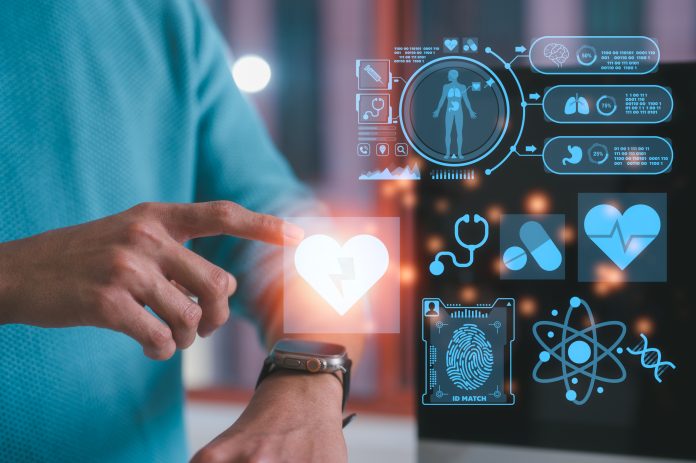Discover how seven groundbreaking technologies, from wearables to AI-driven diagnostics and robotic surgery, will revolutionise NHS care by 2035
By 2035, the NHS could be transformed by seven key healthcare innovations poised to revolutionise patient care and system efficiency. These innovations, from wearable devices that monitor chronic conditions in real time, to artificial intelligence that enhances diagnostics, and robots that support surgery and elderly care, offer a promising vision for the future of medicine.
The future of the NHS
Backed by a new white paper from Imperial College London, this forward-looking approach outlines how science and innovation can meet the growing demands of healthcare in a rapidly changing world. The paper draws on findings from the Future State Programme, commissioned by Wes Streeting, the Secretary of State for Health and Social Care.
Health and Social Care Secretary Wes Streeting said: “We’ve inherited an NHS on its knees – underfunded, overstretched and crying out for reform. Our 10 Year Health Plan is about fixing what’s broken and building a modern, responsive NHS that’s fit for the future.
“That means harnessing the very best of innovation – bringing cutting-edge technology into hospitals, homes, and communities to deliver faster, smarter, and more personalised care.
“From wearable devices that help people stay healthy, to AI-driven diagnostics and personalised treatments tailored to each patient – this is the future of healthcare. And I want the NHS leading it, not lagging behind.”
Professor Lord Darzi of Denham, Co-Director of IGHI and the Paul Hamlyn Chair of Surgery, said: “I was shocked by what I discovered about the state of the NHS in my Investigation last year. Part of the solution to those problems is to embrace innovative technology. The seven technologies, identified after wide-ranging research and discussion with experts, offer an opportunity to leap forward in improving the nation’s health. And they will have the biggest impact when implemented in parallel.”
‘Seven Pillars of Healthcare Transformation’
In ten years, seven technologies are expected to transform the NHS. The radical innovations will address some of the challenges currently facing the NHS, as described in Lord Darzi’s report on the state of the NHS in England.
The report details the ‘Seven Pillars of Healthcare Transformation’:
- Data to Deliver Impact: Integrated and interoperable health data systems will provide real-time, comprehensive patient insights, enabling improved decision-making and coordination across the NHS.
- The Digital Front Door: An advanced digital platform will become the leading portal for patients to access health services, book appointments, receive advice, and manage their care seamlessly.
- The Obesity Breakthrough: New medications targeting obesity will offer a powerful clinical tool to reduce obesity-related diseases, transforming public health outcomes.
- The Wearable Revolution: Continuous remote monitoring through wearables will enable early detection and management of chronic conditions outside hospital settings.
- The Genetic Gateway: Genomic sequencing will become routine, allowing for personalised treatment plans and more precise, targeted therapies tailored to individual genetic profiles.
- AI to Drive Patient Power and Productivity: Artificial intelligence will assist clinicians by automating administrative tasks, improving diagnostics, and freeing up time to focus on patient care.
- Robotics to Support Precision: Robotic technologies will support surgery, rehabilitation, logistics, and direct patient care, enhancing precision, efficiency, and patient outcomes.
Technology frees clinician time for patient interaction, gives patients more control over their health and creates a more personalised solution. Whilst these technologies currently exist, interconnecting all seven across the NHS could reinforce the benefits.
Professor Hugh Brady, President of Imperial College London, said: “Conducting science for the benefit of humanity is at the heart of Imperial’s mission, and this new white paper illustrates how emerging technologies can transform healthcare across the NHS. We are at a pivotal moment where the convergence of artificial intelligence, genomics, and digital innovation is redefining what’s possible in patient care. The UK can lead this healthcare revolution, and Imperial is proud to play a key part in driving the research, innovation, and partnerships that will shape a healthier future for all.”
Professor Tim Orchard, chief executive of Imperial College Healthcare NHS Trust, said: “Artificial intelligence, genomics and digital technology are already starting to reshape NHS care – offering us a glimpse of a future with faster, wiser, and more personalised healthcare to help us all live healthier and happier lives.
“To fully grasp this opportunity for NHS patients and staff, we need more than technology. We need strong leadership and a shared commitment to ensuring that these innovations are fair for everyone, helping to reduce inequalities rather than exacerbating them. Our digital systems must also be secure, robust and ready to handle new tools, with a workforce trained for this exciting new era of healthcare.”
Bold leadership and modernised infrastructure are crucial to support the implementation of the seven technologies across four themes: health promotion, diagnosis, treatment and innovations in healthcare delivery.
Lord Darzi said: “We need bold solutions to the challenges the NHS faces, not just to tinker at the margins. Transformative tech enables us to reimagine healthcare from the ground up, so that it is proactive, personalised and preventative. I hope the NHS 10 Year Plan will seize the opportunities set out here.”











